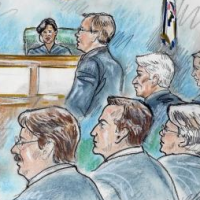“Core Civil Rights at Stake” for Judge Who Struck down Virginia’s Same-Sex Marriage Ban
 Judge Wright Allen presides over gay marriage ban hearing (court drawing: Alba Bragoli Harding, AP)
Judge Wright Allen presides over gay marriage ban hearing (court drawing: Alba Bragoli Harding, AP)
Almost 50 years after a Virginia law was struck down in a major civil-rights case involving marriage, another of its laws restricting who may marry was ruled unconstitutional. And the judge who made the ruling drew close parallels between the cases.
In 1967, the Supreme Court decreed in Loving v. Virginia that interracial marriages could not be restricted. In the current case, Bostic v. Rainey, U.S. District Judge Arenda L. Wright Allen ruled that the part of Virginia’s constitution banning same-sex marriage was unconstitutional. In her decision, Wright Allen wrote, “When core civil rights are at stake, the judiciary must act.”
Her ruling in the case brought by Tim Bostic and Tony London, who sought a marriage license in Virginia, drew fire from conservatives. “Legislating through the courts against the will of the people is lawless disregard for our representative form of government,” Delegate Robert G. Marshall said, according to The Washington Post. Marshall was a sponsor of the amendment to ban same-sex marriage.
But Wright Allen was clear in her pronouncement that courts must act to ensure civil rights for all. “Notwithstanding the wisdom usually residing within proper deference to state authorities regarding domestic relations, judicial vigilance is a steady beacon searching for an ever-more perfect justice and truer freedoms for our country’s citizens,” she wrote.
The ruling, which was stayed pending appeal, followed the course set out in similar lawsuits in Utah, Oklahoma, Kentucky, and Ohio. All the cases referred to the Supreme Court’s verdict in United States v. Windsor (pdf), which struck down parts of the federal Defense of Marriage Act (pdf) that didn’t allow the federal government to recognize same-sex marriages from states that allowed them.
The Windsor decision was written in two parts—one dealing with federal versus state powers and the other dealing with equal rights. All the findings favoring same-sex marriages since then have pointed to the equality part of Windsor.
But Wright Allen didn’t point only to Windsor in her decision. She began her verdict with a statement made by Mildred Loving, the black plaintiff in Loving v. Virginia. In 2007, before the occasion of the 40th anniversary of the announcement of that Supreme Court case, Loving had written movingly of her view on the right to marry the person of one’s choice (in her situation, a white man). “I support the freedom to marry for all,” Loving wrote. “That’s what Loving, and loving, are all about.”
Loving was referred to repeatedly in Wright Allen’s ruling. “Tradition is revered in the Commonwealth, and often rightly so,” she wrote. “However, tradition alone cannot justify denying same-sex couples the right to marry any more than it could justify Virginia’s ban on interracial marriage.”
Wright Allen, 53, was nominated to the federal bench by President Barack Obama. She served in the Navy as part of the Judge Advocate General’s Corps, and then worked as a federal prosecutor and as a public defender.
-Steve Straehley
To Learn More:
Federal judge struck down Va. gay-marriage ban because “core civil rights are at stake” (by Robert Barnes, Washington Post)
Who’s the judge who ruled on Va.’s ban on gay marriage? A seeker of “more perfect” freedom. (by Robert Barnes and David A. Fahrenthold, Washington Post)
Gay marriage: Virginia ruling is third against state bans in three months (by Warren Richey, Christian Science Monitor)
Another Rough Day for Utah’s Marriage Laws: First Polygamy, Now Same-Sex (by Matt Bewig, AllGov)
- Top Stories
- Unusual News
- Where is the Money Going?
- Controversies
- U.S. and the World
- Appointments and Resignations
- Latest News
- Trump Renames National Football League National Trump League
- Trump to Stop Deportations If…
- Trump Denounces World Series
- What If China Invaded the United States?
- Donald Trump Has a Mental Health Problem and It Has a Name






Comments